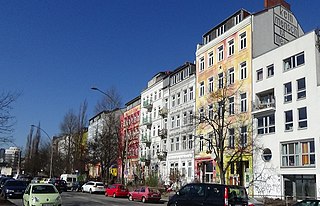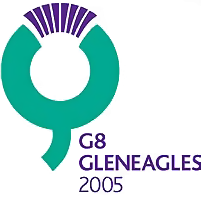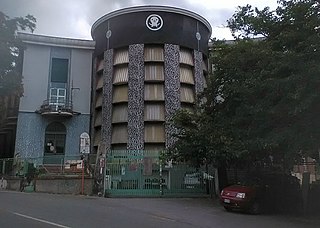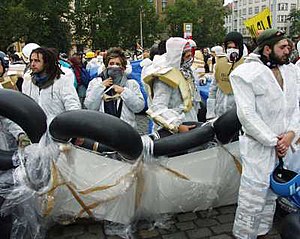
The Independent Media Center, better known as Indymedia, is an open publishing network of activist journalist collectives that report on political and social issues. Following beginnings during the 1999 Carnival Against Capital and 1999 Seattle WTO protests, Indymedia became closely associated with the global justice movement. The Indymedia network extended internationally in the early 2000s with volunteer-run centers that shared software and a common format with a newswire and columns. Police raided several centers and seized computer equipment. The centers declined in the 2010s with the waning of the global justice movement.
The WOMBLES were a loosely aligned anarchist and anti-capitalist group based in London. They gained prominence in the early 2000s for wearing white overalls with padding and helmets at May Day protests, mimicking the Italian group Tute Bianche.

A black bloc is a tactic used by protesters who wear black clothing, ski masks, scarves, sunglasses, motorcycle helmets with padding or other face-concealing and face-protecting items. The clothing is used to conceal wearers' identities from both the police and politically different organizations by making it difficult to distinguish between participants. It is also used to protect their faces and eyes from pepper spray, which is used by police during protests or civil unrest. The tactic also allows the group to appear as one large unified mass. Black bloc participants are often associated with anarchism, anarcho-communism, communism, libertarian socialism and the anti-globalization movement. A variant of this type of protest is the Padded bloc, where following the Tute Bianche movement protesters wear padded clothing to protect against the police.

The 27th G8 summit was held in Genoa, Italy, on 19–22 July 2001 and is remembered as a highpoint of the worldwide anti-globalization movement as well as for human rights violations against demonstrators.

Hafenstraße is a street in St. Pauli, a quarter of Hamburg, Germany, known for its legalized squats. The squats were occupied in 1981 and became a figurehead for autonomist and anti-imperialist politics. After a prolonged battle with the city council which involved demonstrations of over 10,000 people, the buildings were legalized in the 1990s. Today they are owned by a self-organised cooperative.
¡Ya basta! is a phrase in Spanish roughly approximate to "Enough is enough!" or "Enough already!" in US English. It has been adopted by several Latin American insurgent groups as an expression of affront towards issues that sparked the original dissent. Its adoption by the EZLN in Mexico as the movement's motto is exemplary of its popularity and ability to rally diverse ideologies under a common goal.

The 31st G8 summit was held on 6–8 July 2005 at the Gleneagles Hotel in Auchterarder, Scotland and hosted by Prime Minister Tony Blair. The locations of previous G8 summits to have been hosted by the UK include: London ; and Birmingham (1998). It is the first G8 summit to be held in Scotland. A sixth UK summit was held in Lough Erne in 2013; and a seventh UK summit was held in Carbis Bay in 2021.

The Clandestine Insurgent Rebel Clown Army was an anti-authoritarian left-wing activist group primarily active from 2003-2005 in the United Kingdom. The Clown Army used clowning and non-violent tactics to act against corporate globalisation, war, capitalism, and heavy policing of protests, among other issues.

The NYC Ya Basta Collective was a group of anti-globalization activists, based primarily in NYC, active from roughly October, 2000 through October, 2001, inspired by the Ya Basta Association.
The Ya Basta Association is a network of Italian anti-capitalist and pro-immigrants rights organizations and groups, fueled by the Italian social center movement, formed in 1994, and known for the "authorship" of the Tute Bianche, and later disobbedienti phenomena.

Luca Casarini is an Italian activist and former proponent of the Tute Bianche movement. Born in Venice, Casarini was influential in the development of the Tute Bianche movement that practiced social and civil disobedience while dressed in white overalls and padding.
Autonomism or autonomismo, also known as autonomist Marxism, is an anti-capitalist social movement and Marxist-based theoretical current that first emerged in Italy in the 1960s from workerism. Later, post-Marxist and anarchist tendencies became significant, after influence from the Situationists, the failure of Italian far-left movements in the 1970s, and the emergence of a number of important theorists including Antonio Negri, who had contributed to the 1969 founding of Potere Operaio, as well as Mario Tronti, Paolo Virno, and Franco Berardi.

As an act of protest, occupation is a strategy often used by social movements and other forms of collective social action in order to squat and hold public and symbolic spaces, buildings, critical infrastructure such as entrances to train stations, shopping centers, university buildings, squares, and parks. Opposed to a military occupation which attempts to subdue a conquered country, a protest occupation is a means to resist the status quo and advocate a change in public policy. Occupation attempts to use space as an instrument in order to achieve political and economic change, and to construct counter-spaces in which protesters express their desire to participate in the production and re-imagination of urban space. Often, this is connected to the right to the city, which is the right to inhabit and be in the city as well as to redefine the city in ways that challenge the demands of capitalist accumulation. That is to make public spaces more valuable to the citizens in contrast to favoring the interests of corporate and financial capital.
Warcry is an Indian-American environmentalist and anarchist activist, filmmaker, writer and political organizer.
Indiani Metropolitani were a small faction active in the Italian far-left protest movement during 1976 and 1977, in the so-called "Years of Lead". A similar approach was called Stadtindianer in Germany, during the German Autumn.

Self-managed social centres in Italy exist in many cities. They are part of different left-wing political networks including anarchist, communist, socialist, and autonomist. The centres tend to be squatted and provide self-organised, self-financing spaces for alternative and noncommercial activities such as concerts, exhibitions, farmers' markets, infoshops, and migrant initiatives. Over time, some but not all projects have opted to legalize their status.
A self-managed social center, also known as an autonomous social center, is a self-organized community center in which anti-authoritarians put on voluntary activities. These autonomous spaces, often in multi-purpose venues affiliated with anarchism, can include bicycle workshops, infoshops, libraries, free schools, meeting spaces, free stores and concert venues. They often become political actors in their own right.

Buridda, officially known as LSOA Buridda, was a squatted self-managed social centre in the Italian city of Genoa. It was established in 2003 and changed location several times since inception, due to its uncertain legal status. The centre was wholly run and organized by volunteers and funded through donations and fundraising. It offered various services and activities to the community, including open space for exercise, circus-related facilities and skills training, art spaces and workshops, wood- and metalworking shops with tools and machinery, 3D printers, a communal kitchen, and an amateur radio station. On 30 July 2024, Buridda was raided and evicted by the police.

Squatting became a political phenomenon in the Czech Republic after the Velvet Revolution in 1989. Squats in Prague included Sochora, Stary Střešovice and Ladronka. Milada was occupied in 1998 and following its final eviction in 2009, there was a lull in squatting actions. In the 2010s a new social movement squatted houses to highlight the number of derelict properties in Prague and the social centre Klinika was founded in 2014.












